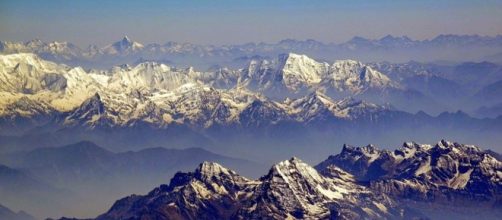Melting of glaciers is associated with Global warming and the focus of scientists is usually on regions in the Arctic with fears of sea level rise and loss of habitats in coastal areas. However, there are glaciers in the Hindu Kush-Himalaya (HKH) region where melting of ice means largescale devastation. The water flows into rivers and could make life miserable for a large section of people. A new study reveals Himalayan glaciers could melt by 2100 unless there is a seriousness to check global emissions.
News AU reports at least eight countries will feel the effect of the melting of Himalayan glaciers and Nepal is one of them.
A group of researchers in Nepal conducted a study to highlight the issue of global warming and its effects on Himalayan glaciers. Its compilation took five years and involved a team of not only researchers and policy experts, but also several organizations.
A third of Himalayan ice cap doomed, finds 'shocking' report https://t.co/c0zYP1JvTr
— Guardian US (@GuardianUS) February 4, 2019
The world must address this issue
The situation is grave because global warming will melt the ice from mountain peaks and leave behind bare rocks. This could happen to the glaciers within less than a century. Philippus Wester the lead author of the report says, “This is the climate crisis you haven’t heard of.”
At Least 1/3 of Himalayan Ice Cap – On Which Almost 2 Billion People Depend – Is Doomed: Glaciers are critical water store for 250m people who live in the region, & 1.65 billion people rely on the great rivers that flow from the peaks into other nations... https://t.co/y7jqU7BKOq pic.twitter.com/HUhm3tgATT
— NatCapCoalition (@NatCapCoalition) February 4, 2019
The world cannot ignore this issue because millions of people in the mountains and in river valleys depend on this source of water for survival.
News AU says once the glaciers melt, it will expose the bare rocks. When the source of water disappears, it will give rise to an unwanted situation because these glaciers feed important river systems in Asia like the Ganges, Indus, Yellow, Mekong, and Irrawaddy. Billions of people in these countries depend on rivers for their food, energy, clean air, and income. Incidentally, a Court has recognized Himalayan glaciers as 'legal persons' regarding the protection of the environment.
Loss of Himalayan glaciers would spell disaster
According to the Guardian UK, the world is poised on the brink of a precipice because of the possible loss of ice from glaciers in the Hindu Kush and Himalaya range due to Climate change.
A recent study has sounded the alarm bell because it will have a direct bearing on the lives of millions. A minor rise in temperatures has an impact on food production. Therefore, there is a need to control both climate change and carbon emissions to arrest global warming. The all-important glaciers could disappear by 2100. In the opinion of Philippus Wester, lead author of the study, the population in these Asian countries is more when compared to that of low-lying island states and the Arctic.


